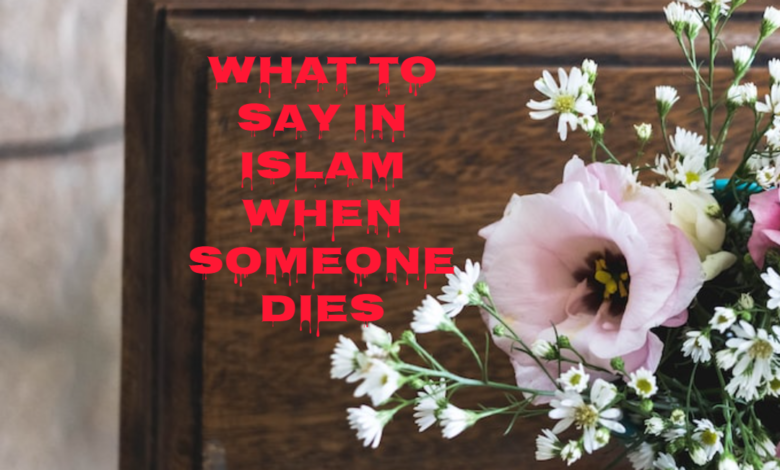what to say in islam when someone dies

Introduction
Losing a loved one is undoubtedly one of the most challenging moments in life. In Islam, death is viewed as a transition from this world to the hereafter, a temporary separation until we are reunited in the afterlife. During such times of grief, it is essential to offer condolences and words of comfort to the bereaved family. This article aims to shed light on the etiquette and what to say in Islam when someone dies.
Expressing Condolences:
When offering condolences to a grieving Muslim, it is essential to be compassionate and considerate. A common phrase used to express condolences is “Inna lillahi wa inna ilayhi raji’un,” which translates to “Verily, we belong to Allah, and to Him, we shall return.” This phrase is derived from the Quran (Surah Al-Baqarah, 2:156) and acknowledges the belief that life and death are in the hands of Allah.
Offering Support:
A grieving family may feel overwhelmed by their loss, and offering support is highly valued in Islamic tradition. Express your willingness to help in any way possible, whether it’s cooking meals, running errands, or providing emotional support. The Prophet Muhammad (peace be upon him) said, “A Muslim who helps his brother in this world, Allah will help him on the Day of Resurrection” (Sahih Muslim 2699).
Reciting Quranic Verses:
Reciting verses from the Quran can provide solace and healing during difficult times. Some of the verses that offer comfort include Surah Al-Baqarah (2:286), Surah Ar-Rahman (55:13), Surah Al-Inshirah (94:5-6), and Surah Al-Fajr (89:27-30). If you’re unsure of specific verses, simply reciting any part of the Quran with sincerity can be beneficial.
Making Dua (Supplication):
Offering supplications for the deceased and their family is highly encouraged in Islam. Pray for the deceased’s forgiveness, mercy, and a high place in Jannah (Paradise). The Prophet Muhammad (peace be upon him) said, “When a person dies, his deeds come to an end except for three: ongoing charity, beneficial knowledge, and righteous offspring who will pray for him” (Sahih Muslim 1631).
Being Patient and Calm:
The grieving process takes time, and it’s essential to be patient with the bereaved family. Avoid rushing them to move on or heal quickly. Encourage them to express their feelings and emotions openly. The Prophet Muhammad (peace be upon him) said, “The patience is at the first stroke of a calamity” (Sahih Al-Bukhari 1303).
Reminding About the Hereafter:
Death reminds us of the transient nature of this worldly life and the eternal life that awaits us in the hereafter. It can be beneficial to remind the bereaved family of the importance of preparing for the afterlife through good deeds, prayers, and seeking forgiveness.
In conclusion, when someone dies in Islam, expressing condolences with compassion and empathy is crucial. Offering support, reciting Quranic verses, making dua, being patient, and reminding about the hereafter are some of the ways to provide comfort to the grieving family. Remember that every individual grieves differently, so be sensitive to their needs and emotions. May Allah grant the deceased forgiveness, mercy, and a place in Jannah, and may He give strength and patience to the bereaved family during this challenging time.
Sure! Here are some frequently asked questions (FAQs) related to various topics:
What do I say when I hear about someone’s passing?
When you hear about someone’s death, you can say “Inna lillahi wa inna ilayhi raji’un,” which translates to “Verily, we belong to Allah, and verily to Him do we return.” This phrase acknowledges that we all belong to Allah, and it is to Him that we will ultimately return.
Can I say other things to express condolences?
Yes, you can express your condolences by saying, “I’m sorry for your loss,” “May Allah grant them Jannat-ul-Firdaus (the highest level of Paradise),” or “May Allah grant you patience during this difficult time.”
What do I say when visiting the bereaved family?
When visiting the bereaved family, you can say, “As-salamu alaykum” (peace be upon you) and express your condolences with kind and comforting words. You can also pray for the deceased and their family during your visit.
Is there a specific prayer to recite for the deceased?
Yes, you can recite the “dua” (supplication) for the deceased. One common dua is: “Allahumma-ghfir lihayyina wa mayyitina, wa-shahidina wa-gha’ibina, wa saghirina wa kabirina, wa zakarina wa-unthana. Allahumma man ahyaitahu minna fa-ahyihi ‘ala al-Islam, wa man tawaffaytahu minna fatawaffahu ‘ala al-Iman. Allahumma la tahrimna ajrahu, wa la tudillana ba’dahu.” This dua asks Allah for forgiveness for the living and the deceased, and it seeks guidance and strength to remain steadfast in faith.
Should I say anything specific at the funeral or graveside?
At the funeral or graveside, it is appropriate to recite Quranic verses, especially Surah Al-Fatiha and other prayers for the deceased’s forgiveness and mercy. You can also make a general dua for the deceased, asking Allah to grant them peace and a place in Paradise.
Can I give financial or emotional support to the bereaved family?
Yes, offering financial and emotional support to the bereaved family is highly encouraged in Islam. Providing help and assistance during their time of need is considered a noble and charitable act.





